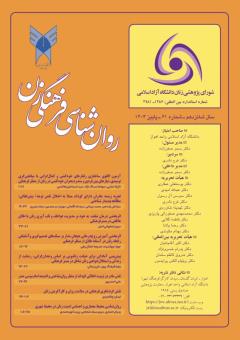پیش بینی آمادگی برای خیانت زناشویی بر اساس وجدانگرایی، رضایت از زندگی و استقلالخواهی زنان شاغل در بستر فرهنگی
محورهای موضوعی : روان شناسی
زهرا فرهنگ پرور
1
![]() ,
علی زینالی
2
,
علی زینالی
2
![]()
1 - کارشناسی ارشد روانشناسی بالینی، گروه روان شناسی، دانشکده علوم انسانی، واحد ارومیه، دانشگاه آزاد اسلامی، ارومیه، ایران
2 - دانشیار، گروه روانشناسی، دانشکده علوم انسانی، واحد خوی، دانشگاه آزاد اسلامی، خوی، ایران
کلید واژه:
چکیده مقاله :
هدف پژوهش حاضر، پیشبینی آمادگی برای خیانت زناشویی براساس وجدانگرایی،رضایت از زندگی و استقلالخواهی زنان شاغل در بستر فرهنگی بود.. جامعه آماری پژوهش تمامی زنان شاغل دستگاههای اجرایی شهرستان ارومیه در سال 1402 بود. نمونه پژوهش 267 نفر بود که با استفاده از روش نمونه گیری در دسترس انتخاب شدند. روش پژوهش توصیفی از نوع همبستگی بود. ابزار پژوهش پرسشنامه آمادگی برای خیانت زناشویی دریگوتاس وهمکاران( 1999)، مقیاس رضایت از زندگی دینر و همکاران( 1985)، پرسشنامه شخصیت ده مادهای رامستد و جان ( 2007) و مقیاس فردگرایی و جمعگرایی هوی (1988) بود. دادهها با استفاده از آزمون ضریب همبستگی پیرسون و تحلیل رگرسیون مورد تجزیهوتحلیل قرار گرفتند. نتایج نشان داد، وجدانگرایی و رضایت از زندگی با آمادگی برای خیانت زناشویی رابطه منفی معنی داشته و با استقلالخواهی رابطه مثبت و معناداری در زنان شاغل وجود دارد. همچنین، نتایج نشان داد که سه متغیر وجدانگرایی ،رضایت از زندگی و استقلالخواهی توانایی پیشبینی 59 درصد از تغییرات آمادگی برای خیانت زناشویی را در زنان شاغل دارند. مطالعه حاضر، وجدانگرایی و رضایت از زندگی را به عنوان عوامل محافظتکننده و استقلالخواهی را به عنوان عامل خطرساز در مستعد کردن زنان شاغل به خیانت زناشویی گزارش میکند. بنابراین با توجه به هنجار فرهنگی، آگاهی عموم از علل و شرایط بروز آسیبهای فرهنگی، اجتماعی وروانی خیانت، نقش مهمی در پیشگیری ازآن در جامعه ایفا میکند.
The purpose of this research was to predict the marital infidelity proneness among employees married women based on conscientiousness, life satisfaction, and independency in cultural context. The statistical population included all married women working in the executive administrations of Urmia City in 2023. The sample comprised 267 individuals whom were selected via convenience sampling procedure. The research method was descriptive-correlational. To collect data Drigotas & et al. (1999) Infidelity Proneness Scale, Diener & et al. (1985) Satisfaction with Life Scale, Rammstedt & John (2007) The Ten-Item Personality Inventory & Hui (1988) Individualism and Collectivism Scale were implemented. Data analysis was conducted by applying Pearson’s correlation coefficient test, regression analysis. The findings indicated that conscientiousness and life satisfaction were significantly and negatively related to the proneness to marital infidelity, while a positive and significant relationship existed with independency among employees married women. Furthermore, the results also demonstrated that the three variables, conscientiousness, life satisfaction and independency could predict 59% of the variance in the proneness to marital infidelity among the participants. This study identified that conscientiousness and life satisfaction were as protective factors against the proneness to marital infidelity in working married women, and the independency as a risk factor. Therefore, concerning the cultural norms, public awareness of the causes and conditions of cultural, social and psychological vulnerability of marital infidelity, could play critical role in preventing it in the society.


